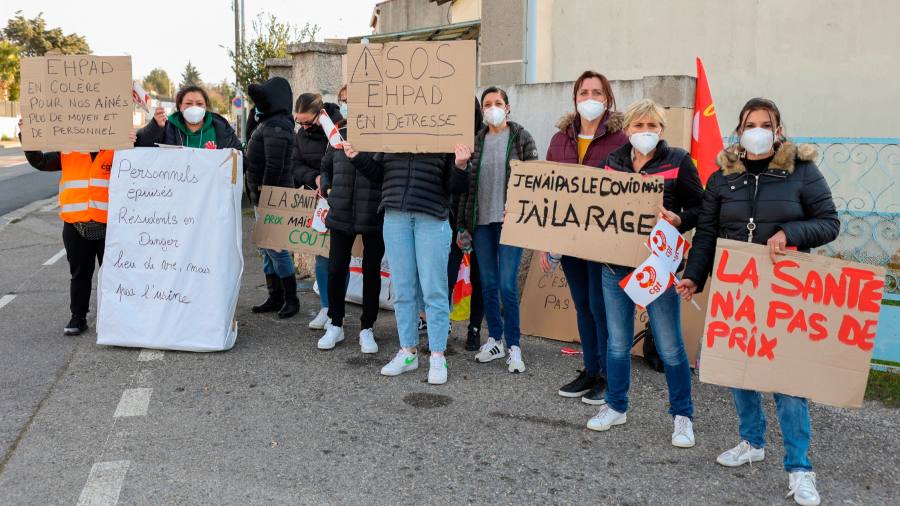
Nursing home group Orpea was long a stock market darling whose profits grew as it expanded in its home market of France and overseas. Behind its success was its trusted brand — families saw its facilities as a safe place to send their elderly parents to live.
Journalist Victor Castanet put paid to all that in January when he published a bombshell book called The Gravediggers that documented mistreatment of residents at Orpea facilities and alleged several types of financial fraud were practised by the group.
In France, where a chunk of Orpea’s revenue comes from state subsidies for care of the elderly, Castanet also exposed how the group cultivated close ties with politicians and regulators and alleged this enabled it to avoid oversight.
The fallout was immediate: Orpea shares fell by more than half following publication, while those of unrelated French rival Korian fell by a quarter, erasing almost €4bn in market value.
But the story did not end there. The book catalysed a debt crisis that now threatens the group’s survival. Orpea has become a cautionary tale for companies that expanded too aggressively when money was cheap and are now unable to handle their heavy debts as interest rates rise and the economic outlook dims.
For the second time this year, Orpea in late October entered a court-protected process to restructure its €9.5bn debt pile by negotiating with its creditors. An earlier court-supervised plan finalised in June to raise more debt from its banks and sell off real estate assets to pay down debt proved too little, too late, forcing Orpea to take much more radical steps to cut its leverage that now stands at 25 times net debt-to-ebitda.
Orpea unveiled a restructuring plan last week that includes a debt-to-equity swap worth about €3.8bn that is likely to wipe out shareholders and a capital increase of at least €1.3bn but preferably around €2bn from new or existing investors. The equity value of Orpea has shrivelled to under €500mn, a reflection of the coming “unparalleled dilution” that would multiply the share count by more than 15 times, according to analysts at Alphavalue.
What began with an exposé of how food and adult nappies were being rationed to the detriment of elderly residents in Orpea’s facilities has mutated into a story of excessive risk-taking, poor corporate governance, and aggressive accounting practices. “Orpea was a house of cards so when the wind started blowing it could not resist,” says one person close to the restructuring.
There are dozens of legal investigations now under way to determine if the care of residents was negligent and also whether any executives may have committed fraud, embezzlement of public funds and insider trading.
Orpea says it is fully co-operating with investigators and regulators, and has got rid of 30 top executives, replaced the chief executive and named a new chair and directors.
Castanet, who spent three years investigating his book, says the scandal was a failure of governance at all levels. “Orpea has become a byword for out-of-control capitalism in France,” he told the Financial Times.
While the Orpea case may be a dramatic outlier, it also holds lessons for what is to come. Lawyers and bankers in Paris predict a wave of debt restructurings as the protective effect of pandemic aid fades and companies’ cash generation worsens because of ballooning energy costs and lower demand.
The strains can already be seen. Bankruptcy filings were up 41 per cent to around 38,500 in the past 12 months through to the end of October, according to figures from Insee, the French statistics agency, although they remain about 25 per cent lower than pre-pandemic.
A battalion of lawyers is lining up to try to protect their clients’ interests in the Orpea debt restructuring negotiations that are expected to go on until January.
This is one of the first big cases to go through new bankruptcy rules that came into effect in 2021 when France transposed a 2019 EU directive aimed at harmonising practices across member states and encouraging early, preventive restructurings.
Experts say the new rules bring France more into line with the US and UK approach to bankruptcy proceedings, notably by scrapping the old system in which shareholders enjoyed veto power over some restructurings, even when the company’s equity had little value.
It is a far cry from the days when Orpea set the standard for nursing homes in France. Instead the group is now creating case law that will guide the way courts treat heavily indebted companies in the future.